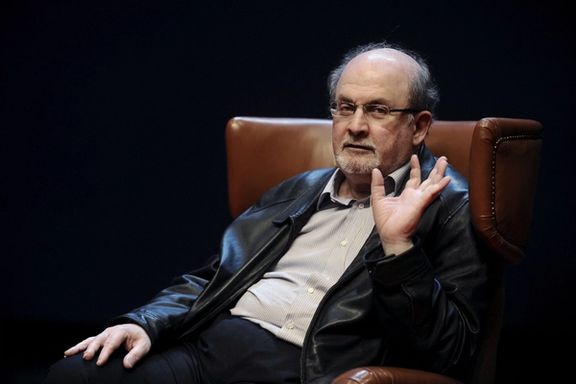Iran Spokesman Calls Stabbed Rushdie ‘A Pawn Of Empire’

Author Salman Rushdie was on a ventilator in Erie, Pennsylvania, Saturday after being knifed at a literary event in New York state.

Author Salman Rushdie was on a ventilator in Erie, Pennsylvania, Saturday after being knifed at a literary event in New York state.
“The news is not good,” Andrew Wylie, Rushdie’s agent, said late Friday. “Salman will likely lose one eye; the nerves in his arm were severed; and his liver was stabbed and damaged.”
Rushdie, the subject of a ‘death sentence’ issued by Iranian leader Ruhollah Khomeini in 1989, was airlifted to hospital after being stabbed repeatedly at around 11am local time as he was about the deliver a lecture at the Chautauqua Institution, New York state.
Police reported that a state trooper at the event took the attacker into custody after what witnesses said was an assault lasting 20 seconds. An endocrinologist in the audience told the New York Times that Rushdie had multiple stab wounds, including one to the right side of his neck.
Police later named the suspect as Hadi Matar, a New Jersey resident aged 24, and said they were investigating his motive.
While the official news agency IRNA reported the attack only briefly, Mohammad Marandi, an American-born academic who has acted as a spokesman-cum-advisor for Iran in nuclear talks in Vienna, tweeted he would not be “shedding tears for a writer who spouts hatred & contempt for Muslims & Islam.”
Marandi called Rushdie a “pawn of empire” and suggested it was “odd” the attack should occur just as agreement on restoring the 2015 Iran nuclear deal was “near.”
Fuel to the flames
Khomeini’s edict was February 14, 1989, after the publication of Rushdie’s third novel, The Satanic Verses. While the book had already produced protests in Islamabad, Pakistan, in which at least six people died, Khomeini’s ‘fatwa’ added fuel to the flames, with widespread protests.
While Rushdie went into hiding for six years, his Japanese translator Hitoshi Igarashi was stabbed to death in 1991, while his Italian translator survived a knife attack the same year. Tehran’s Behesht Zahra cemetery has a shrine for Mustafa Mahmoud Mazeh, born in Guinea, was died in London in August 1989 when priming a book bomb in London apparently for an attack on Rushdie.
Reformist president Mohammad Khatami in 1998 assured London that the Iranian authorities would not assist anyone attempting to carry out the death sentence. But Ali Khamenei, who succeeded Khomeini in 1989 as supreme leader, made clear on several occasions the edict remained in force.
Best foreign novel
Ironically, Khamenei, when president in 1985, had announced Iran’s award of its best foreign novel prize for Rushdie’s third novel, Shame. But Iran’s leader has not wavered over Khomeini’s edict, including endorsing it in a tweet in 2019, which led to the temporary suspension of his account.
Semi-official bodies have never forgotten Rushdie. In 2012, it was widely reported that the 15 Khordad Foundation, a quasi-official religious body in Iran, had increased an existing bounty offered for killing the novelist from $2.8 million to $3.3 million, an amount raised by $600,000 by Iranian media bodies in 2016.
Iran Daily in February praised the “deep understanding, true attitude and reliable future vision” of Khomeini in issuing the edict, which had encouraged Muslims to show that “if they are led properly, can be the pioneers of the revival of religious values and stand up against the hatred spread by the West against Muslims.”
Rushdie, who was born in Kashmir and grew up a Muslim, has lived in New York for the past 20 years. When he was knighted by the British Queen Elizabeth in 2007, Ayman al-Zawahiri, the al-Qaeda leader killed July 31 by an American drone stroke in Kabul, promised “a very precise response.”
‘Stupidly optimistic’
In an interview last year with the Guardian newspaper, Rushdie called himself “stupidly optimistic”and suggested the “first people to suffer” from “censorship…are underprivileged minorities.”
“One thing I feel, well, proud of, let’s say, is if you knew nothing about my life, if all you had were my books, I don’t think you would feel that something traumatic happened to me in 1989,” Rushdie said. “I’m glad I had the brains to think, in the middle of all that, I don’t want to be the victim of this. I could write frightened or revenge books, and both would make me a creature of the event. So, I thought, Be the writer that you want to be.”